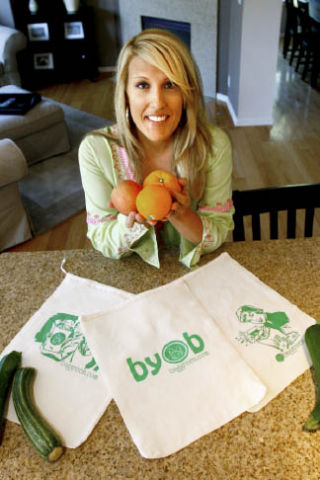▼ Islander is selling reusable cotton bags online for your fruit and vegetables.
Heather Hadley has always been interested in keeping the environment in which she lives healthy, but after giving birth to son Breckin, it suddenly became more personal.
“I’m just a stay-at-home Bainbridge Island mom with a busy 4-year-old who has the passion to rid the world of plastic produce bags,” she says. Produce bags? What would we do without bags in which we stuff our fruits and vegetables?
No problem, says Heather, who figures that 500 million to 1 trillion plastic bags are now used worldwide every year. She’s doing her part and making some greenbacks, too, after starting Green Bag in January.
Her product is reusable, 100 percent natural cotton bags, which, carrying one of the three logos she has created, are made in Indonesia and then sold from her online store in the U.S. She says about 500 (primarily 12-by-16-inches, though there is a smaller bag, too) have been sold as four-packs for $14 during the last six months.
She hopes to eventually approach grocery stores to carry her product, including Town & Country on Bainbridge, but care of her son and selling out of her home is keeping her busy. She prefers keeping the business small at this point.
Heather’s research tells her that the average shopper uses about 10 plastic produce bags a week, which adds up to around 500 a year.
“They’re really not necessary because most people just put their produce in the crisper and then just throw them away,” she says. “It’s a terrible waste and something like my product is a perfectly reasonable alternative.”
Her white bags are light enough not to add weight at the check-out counter and, as she puts it, “are not boring and can be reused again and again” by simply hand-washing them in cold water and then drying them on a line. The bags are not bleached nor chemically treated.
She says competition for the larger cloth bags used to carry groceries home has increased dramatically in recent months, but she hasn’t found a serious competitor for her produce bag online. But her emphasis remains more on doing her part to save the environment than making a lot of money.
“Because there are so many blogs out there now, I’m getting a lot of interest just posting on the blogs and through my own Web site,” Hadley said. “It could get bigger when I approach the grocery stores, but for now I’m happy just dealing with online buyers.”
She spends time taking orders and sending out product (wrapped in newspaper and other recyclable materials) when her son is taking a nap or goes down for the evening. She’s also done some marketing on greenmomfinds.com, where she offers a free bag.
“When people find out they didn’t win, most of the time they ask more questions about the product and then purchase a four-pack,” she says. “Word-of-mouth is really working for me because the product is easy to buy and can last forever. And it’s green.”
She was also excited this week when the Seattle City Council approved a 20-cent voluntary fee for consumers who insist on bringing home a disposable paper or plastic shopping bag from convenience, drug and grocery stores.
Seattle officials estimate residents use 360 million paper or plastic bags each year, and believe the ban will cut plastic bag use in half. The city plans to distribute at least one free reusable bag per household before the fee goes into effect in January. Los Angeles has also banned plastic shopping bags from stores.
“Stores are definitely getting serious about it,” she says. “People are too. I did an eco-fest in April, and sold out of 65 bags in a few hours.” She says her plan is to contact T & C, Central Market, Real Foods on the island, and other natural food stores on the Kitsap and Olympic peninsulas.
Is she prepared to deal with a 500-bag order?
“I think so, because I’ve got a process that works,” Heather says. “I don’t want to turn this into a big corporation, but I do want to be successful at it because it’s an important product.
“If I have to hire people I’ll definitely go that way. I’m a great multi-tasker and I don’t see any reason why I can’t make a go of it.”
She said the blogs and her Web site have led to orders being placed throughout the United States. “It helps being in the Northwest because people here are obviously very conscious of what is happening to the environment. But more and more that’s happening everywhere in the country.”
She was hesitant to go forward after coming up with the idea, but she received important support from her husband, Brian Hadley, who is a partner with the advertising firm Cole & Weber in Seattle.
“He said it was great idea and that I had to do it,” she says. “There are a lot of things to do in running a business that are challenging, so this is not just some romantic idea. But it’s great to be doing something that you really believe in.”
She believes the product has been accepted because it is simple and inexpensive. But the biggest attraction is the “green” factor.
And yes, she says, ringing the death knell to plastic produce bags certainly would be worth the effort.
“I’m going at it one bag, one day, at a time,” she says.
==========
Plastic bags are one of the 10 most common trash items along the American shorelines, on land and in water. Only 0.6 percent of plastic bags are recycled annually.
Bag Green products are constructed of 100 percent natural cotton, a fiber that is sustainable, renewable and biodegradable. Bag Green can be reached at P.O. Box 11262, Bainbridge Island, WA 98110, or at baggreen.com.



